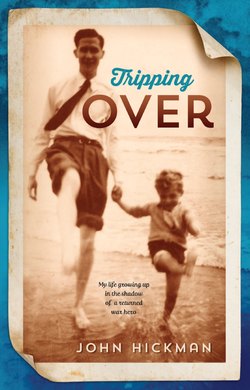Читать книгу Tripping Over - John Hickman - Страница 6
На сайте Литреса книга снята с продажи.
AUTHOR’S NOTE
ОглавлениеAs author, my choice was to write under my own name, although I may require therapy. Names have been changed out of consideration for people I have been unable to contact, and for legal reasons. The writer acknowledges the trademarked status and trademark owners of various products referenced in this work of narrative non-fiction, which have been used without permission.
The publication/use of these trademarks is not authorised, associated with, or sponsored by the trademark owners.
Characters, places, brands, media, and incidents are true as remembered by the author and those close to him. The events depicted occurred half a century ago in the paradoxical 50s, and the swinging 60s. A time when the Beatles were the soundtrack of everyday life and threats of nuclear oblivion came and went with monstrous regularity. Before political correctness went mad and
‘Core’ promises became an excuse for failed election pledges, and before people learned how to sue when they spilled a hot drink on themselves.
Fuck was said for the first time in public on the British stage. The second time was in 1965 on British television. Middle-class, menopausal ladies aged ten years overnight. Policemen carried truncheons and whistles. Firearms were rarely used and yet permits were unnecessary. Streets were safe by comparison with 2013 and an Englishman’s home was his castle. The word racist was not in the author’s Concise Oxford Dictionary (1962) and the word terrorist while understood was not part of our daily vocabulary.
Raymond ‘Ossie’ Clark designed clothes girls could wear without a bra. Mary Quant introduced the mini-skirt. Coke was something we drank from glass bottles, and we mowed grass. To be gay meant being happy, and feeling a little queer meant being unwell. The author’s generation was the last to believe women needed husbands to have babies.
English people were seen as white. They were eccentric, charming and polite. Young men were more interested in their search for love, lust or romance than soccer. Tea bags were new, as was sliced bread. Both were viewed with suspicion by older generations. Every home had a tannin-stained teapot, their favourite brand of tealeaf in a tin, and their own special way of making tea. The tea cosy never strayed far from the pot. It was before the contraceptive pill, when only heterosexuals used Durex to avoid unwanted pregnancies. Telephones with rotary dials were situated on a small table in the hall. One was enough for an entire household. Its use was almost ceremonial.
The author drank his first cappuccino in a cafe in 1962 and when only girls had pierced ears. All male teachers wore ties, and caned. They threw blackboard rubbers or chalk at students if they thought they weren’t paying attention in class. Children were encouraged to ask strangers for assistance to cross busy roads and rode bicycles without helmets.
Australia had an unashamed White Australia policy. Black people were called blacks. The majority of whites disliked them culturally and economically.
Tripping Over is a work of narrative/creative non-fiction. It is intended to be interesting and entertaining story of life in post war England in the 1950s and 1960s. It provides an historical glimpse into the author’s family’s lives. This work is a faithful rendering of those events, locations and characters as recalled by himself and his family; Dad, Gran, Gramps, Pamela (Pandy) and Carole.
Down to the last complicated, looped twirl of his DNA, the author claims to have had remarkable clarity with most of the story. Where memory has failed or a gap has been discovered of which the author was unaware, the tone has been recreated with the general content for dramatic flow. Characters and events may have been changed or recreated for creative effect.
